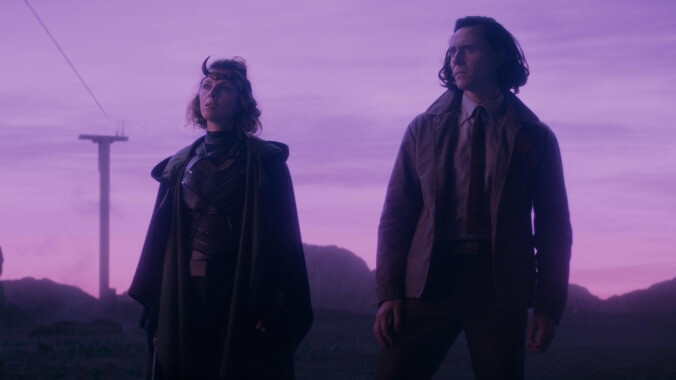Loki’s third episode finally confirms the God Of Mischief’s bisexuality
Loki is officially the most prominent LGBTQ+ character in the Marvel Cinematic Universe

A decade after his introduction in Thor, it’s now confirmed that Marvel Cinematic Universe’s Loki (Tom Hiddleston) is canonically queer. The reveal shouldn’t be a surprise because in the comics, Loki is both pansexual and gender fluid; the latter bit was also confirmed in the premiere of Disney+’s Loki. Now, in episode three, titled “Lamentis,” Loki casually states he is bisexual, too. Happy Pride Month, indeed.
In this week’s episode, Loki and the female variant, Sylvie (Sophia Di Martino), are stuck on a moon called Lamentis-1 in the year 2077, just hours before it’s about to be destroyed by its primary planet. They have no choice but to bond as they plot their escape from doomsday (which Sylvie notes is the only apocalypse she’s ventured through that really does destroy everything). While traveling on a high-speed train, the two discuss their past(s) and a curious Loki asks Sylvie about her love life. She averts it by returning the question to him, leading to the following exchange:
Sylvie: How about you? You’re a prince. Must’ve been would-be-princesses… or, perhaps, another prince?
Loki: A bit of both. I suspect the same as you.
This conversation, and the entire episode itself, takes place under the soft glow of purple lighting, with plenty of blue costumes, so everyone on the Loki team is clearly committed to bringing the bisexual energy to life even outside of the dialogue. Loki director Kate Herron, who is bisexual herself, shared on Twitter that it was her goal from the beginning to acknowledge the God Of Mischief’s sexual identity. Di Martino also responded with a nod to the lighting techniques used in the episode, because usually a hues of blue, purple, or pink are meant to represent bisexual characters or storylines.
Loki is now officially the first prominent LGBTQ+ character in the MCU. Taika Waititi has previously stated that the upcoming Thor: Love And Thunder will address Valkyrie’s (Tessa Thompson) bisexuality as well. (You might recall that the last time this came up, in Thor: Ragnarok, Marvel cut the one scene that confirmed the character’s bisexuality). In Marvel’s Eternals, Brian Tyree Henry’s Phastos is gay. Marvel Studios is clearly trying to overcome the flak for being late to the party with its dismal LGBTQ+ representation.
Loki and Sylvie’s heart-to-heart leads to him confessing that, sadly, none of his hook-ups with men and women led to anything real. This also acts as a reminder that the MCU is virtually sexless when it really doesn’t need to be. There’s generally no indication that these extremely hot superheroes engage in anything remotely sexy with each other or anyone else. Are we to believe Loki and Sylvie wouldn’t at least consider sleeping with each other after that reveal? They’re both just narcissistic enough to do it, despite being Loki variants.
Even if we don’t see our favorite Asgardian antihero get frisky with anyone on-screen just yet—we still have three more Loki episodes left, so you never know— his queerness is a major deal for MCU fans, especially after Anthony Mackie’s recent comments regarding fans ’shipping The Falcon And The Winter Soldier’s Sam and Bucky. Let’s see how committed Marvel is now to expanding on Loki’s identity beyond one beautifully lit episode.